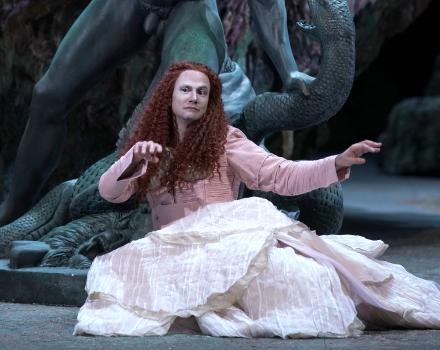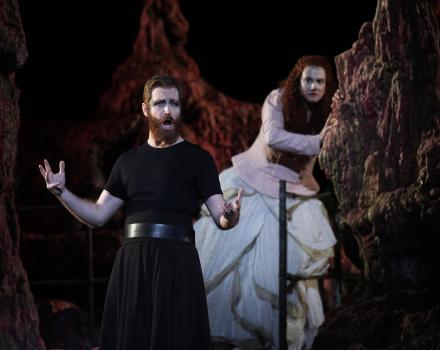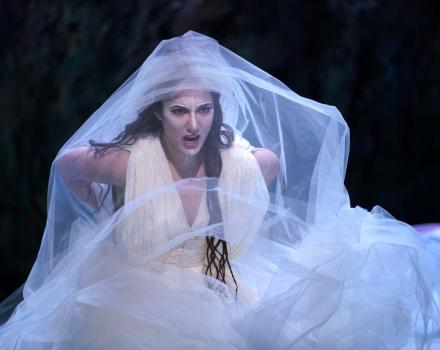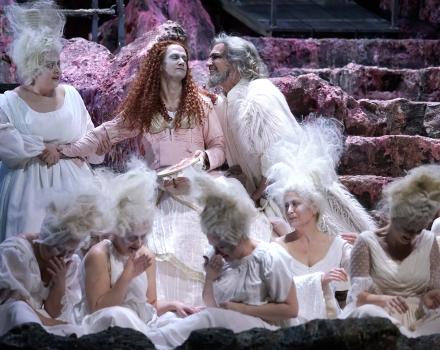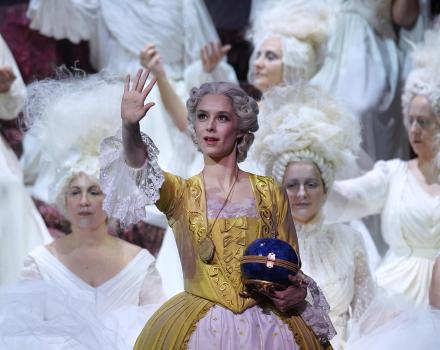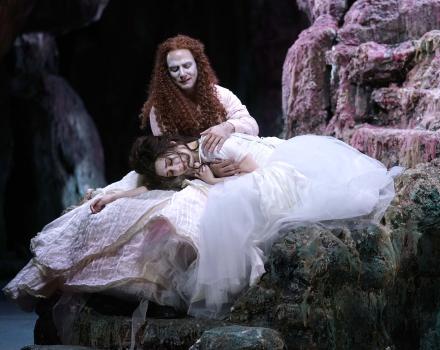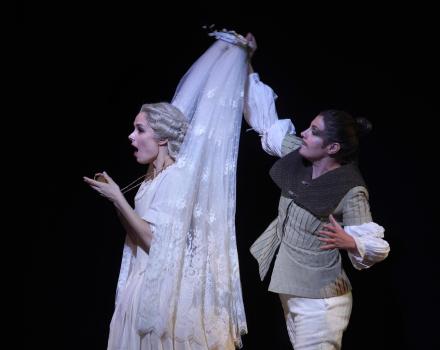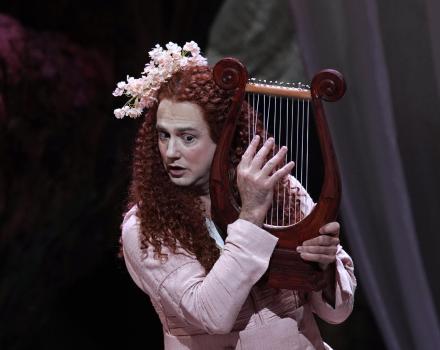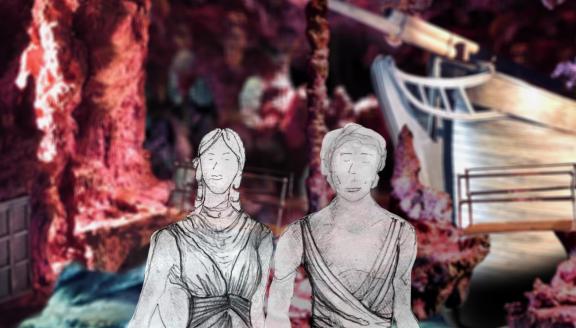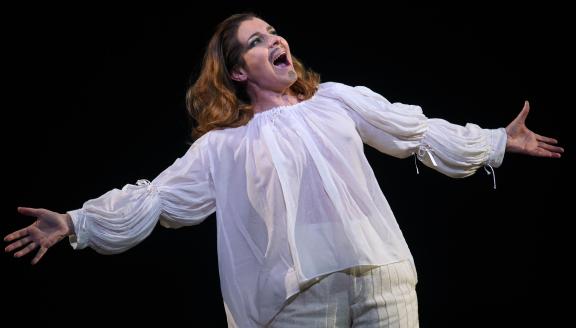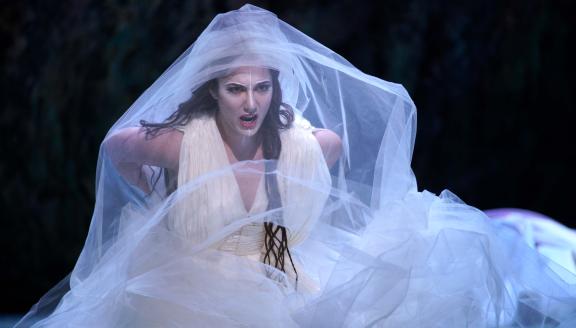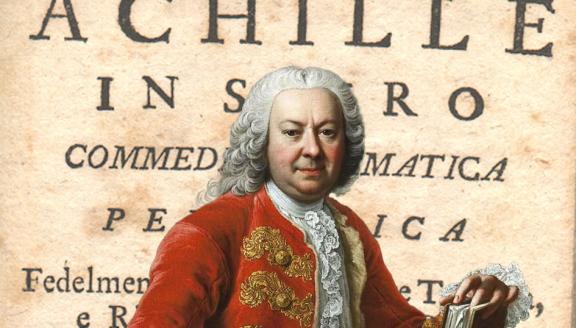
Thetis, mother of Achilles, disguises her son as a woman to hide him in the court of King Lycomedes of Scyros and prevent him being sent off to the Trojan War. The plan begins to come apart when Achilles, incapable of subduing his virility, falls in love with Princess Deidamia.
Disguise and transvestism have been an essential part of opera plots from the Venetian origins of the genre. In line with this tradition, the story of Achilles on the Island of Scyros inspired more than 30 compositions for voice based on Metastasio’s libretto of 1737. The Italian composer Francesco Corselli was a key figure in Spanish opera of the 18th century. As Kapellmeister of the Royal Chapel of Madrid for nearly 30 years, he was the principal supplier of opera to the Spanish court. Some of these were under the artistic direction of the famous castrato Farinelli. First seen in 1744 at the Real Coliseo del Buen Retiro in Madrid, Achille in Sciro was composed to celebrate the marriage of the Infanta of Spain, María Teresa Rafaela, to the Dauphin of France. Streamed live from Madrid, this production staged by Mariame Clément and conducted from the harpsichord by Ivor Bolton, is a milestone in the recovery of Spain’s musical heritage.
Cast
|
Licomede
|
Mirco Palazzi
|
|---|---|
|
Ulises
|
Tim Mead
|
|
Deidamia
|
Francesca Aspromonte
|
|
Teagene
|
Sabina Puertolas
|
|
Achille / Pirra
|
Gabriel Diaz
|
|
Arcade
|
Krystian Adam
|
|
Nearco
|
Juan Sancho
|
|
Chorus
|
Coro Titular del Teatro Real
|
|
Orchestra
|
Orquesta Barroca de Sevilla
|
| ... | |
|
Music
|
Francesco Corselli
|
|---|---|
|
Text
|
Pietro Metastasio
|
|
Conductor
|
Ivor Bolton
|
|
Director
|
Mariame Clément
|
|
Sets and costumes
|
Julia Hansen
|
|
Lighting
|
Ulrik Gad
|
|
Choreography
|
Mathieu Guilhaumon
|
| ... | |
Videos
STORY
CONTEXT
Thetis discovers through an oracle that the Greeks will be unable to conquer Troy unless her son Achille [Achilles] takes part in the war, but that in so doing he will die on the battlefield. In an attempt to circumvent his tragic destiny, she decides to hide him away at the Court of King Licomede [Lycomedes] on the island of Skyros, dressed as a maiden called Pirra [Pyrrha], among other women including Deidamia, the monarch’s daughter. Achilles and Deidamia then fall hopelessly in love.
ACT I
Achilles (dressed as Pyrrha) and Deidamia are participating in rituals in Bacchus’s honour as some ships approach the island playing military music. Deidamia tries to run away in fright, but Achilles is attracted to the clamour of battle, and his sweetheart reproaches him angrily that he prefers war to her love. One of the seafarers is Ulisse [Ulysses], who has come to the island on a secret mission to find Achilles and take him to Troy. He immediately senses the farce. Nearco, Achilles’s tutor, informs the young couple that the King wants to introduce them to Deidamia’s betrothed, Prince Teagene [Theagenes], provoking Achilles’s jealousy.
Deidamia argues with her father, rejecting the betrothal. Achilles reproaches his sweetheart for not telling him about it and she promises to be faithful to him as long as Achilles remains hidden in his disguise as Pyrrha. Suddenly, cunning Ulysses appears and claims to see a resemblance between the princess’s fake female friend and Peleo [Peleus] (Achilles’s father).
Lycomedes introduces the betrothed couple to each other and Theagenes courts Deidamia graciously, causing the jealousy of Achilles, who remains hidden. With irony, Lycomedes explains to the prince that Achilles—whom he believes to be Pyrrha—is his real rival, revealing the deep affection that exists between the two girls and causing his daughter to blush, which is interpreted as modesty and daughterly humility. The betrothed couple are left alone while Achilles remains hidden, and Deidamia once again rejects Theagenes’s words of love. When she leaves, the prince tries to follow her but is fiercely stopped by Achilles, triggering Theagenes’s fascination with this ‘maiden’, as he believes Achilles to be.
ACT II
Using deception and contrivance, Ulysses goads Achilles, who listens discreetly as Ulysses uses rhetoric to praise Hercules’s heroic qualities, putting the disguised hero’s frustration to the test. Lycomedes welcomes the seafarers and promises to contribute ships and warriors to the war against Troy. He then asks Achilles to intercede to persuade his daughter to accept the marriage, again causing the wrath of Peleus’s son, who is opportunely interrupted by Nearco. Achilles confesses to his tutor that he cannot continue to dress as a woman and Nearco pretends to support him, insisting that his beloved’s pain is not relevant, so that Achilles eventually calms down.
To celebrate the arrival of the Greeks, Lycomedes asks Achilles to sing for the guests. He accepts reluctantly, singing sweetly and playing the zither. The servants bring in gifts from Ulysses, who grasps the chance to continue his attempt to win over the unsuspecting young man. The presents include jewellery, clothes and luxury items—which attract the ladies’ attention—as well as weapons and shining armour by which Achilles is immediately fascinated. Suddenly, an alarm sounds as if the island had come under attack, but which is really part of a farce Ulysses has orchestrated with the help of his confidant, Arcade. Everyone rushes out of the room except Achilles, while Ulysses and Arcade remain hidden. Excited by the fanfare, Achilles throws down his zither, picks up the sword and shield, and is about to set off to defend the island, revealing his true self. At that moment, Ulysses makes his appearance, praising the now-unveiled hero, showing him his reflection in the shield and making him see the contradiction of dressing as a woman. Achilles finally reverts to his true identity as man and warrior, reproached by Nearco, who reminds him of the pain he will cause his sweetheart. Achilles asks him to console Deidamia. Once again in vain, Theagenes takes the opportunity to court Deidamia, whose despair he is unable to comprehend.
ACT III
Achilles and Ulysses are about to embark for Troy when the news arrives that Lycomedes wants to prevent their departure. The Greeks flee but Achilles refuses to be seen as a coward. In the meantime, Deidamia arrives, reproaching him for leaving her to her fate, whereby Achilles decides to stay on the island.
Before the court, Achilles asks Lycomedes for his daughter’s hand and, faced with such an adversary, Theagenes renounces his suit. Satisfied with the outcome, Lycomedes forgives Achilles his earlier deceit and agrees to the hero’s marriage to Deidamia, after which he will allow Achilles to leave for the Trojan War.
Gallery

